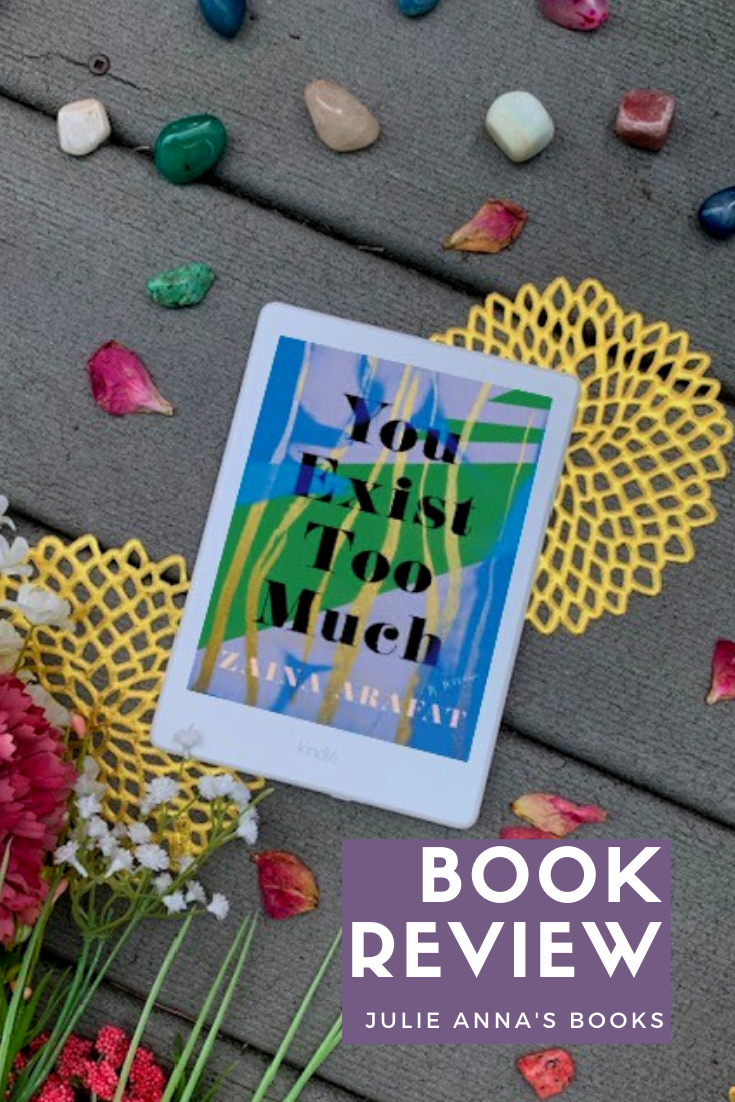Release Date: June 9th, 2020
Genre(s): Adult Fiction, Contemporary, Literary Fiction. LGBT
Publisher: Catapult
Pages: 272
Rating: 
You Exist Too Much is a literary fiction and debut novel by Zaina Arafat. It follows a Palestinian-American woman and the exploration of her identity and internal traumas; her life told in vignettes between Palestine and the United States. After several destructive behaviors and the end of her first serious relationship, the narrator checks into an unconventional treatment center to treat love addiction. In this time, she explores how her early life and relationship with her mother contributed to her behaviors – and her journey to recovery begins here.
Review
You Exist Too Much covers much more than what the synopsis promises. The synopsis discusses gender identity and sexual orientation, cultural differences between the nations she grew up in, and relationships. But this book covers many other topics, including the revelation that the narrator has an eating disorder and her past forms of treatment. While in treatment, the narrator meets other characters with different types of addictions, which adds in the discussion of addiction as a whole. There’s quite a bit to unpack here, and as the novel progresses, we learn more about how these elements cotributed to the narrator’s life and well-being as a whole.
That being said, there are some elements of this book that I wish were discussed in more detail (things that were discussed in the synopsis in particular), but for such a short book there wasn’t a lot of time to do so. One of the earlier vignettes of this book is about the time the narrator was yelled at as a child for exposing her legs outside the Church of the Nativity. This prompts the narrator to describe her feelings toward this confrontation and how that impacted her own feelings regarding womanhood. However, this concept isn’t discussed as much beyond this point.
There are two primary issues that the narrator discusses when it comes to her addiction – the lack of love and support from her mother, and the feeling of not belonging no matter where she is in the world. These issues, which presented themselves very early in her life, are what we see scenes of throughout the book, especially during her treatment.
You Exist Too Much changed my expectations for books in general. In most literary fiction, I am accustomed to gradual character growth and positive change, but the narrator in You Exist Too Much has a different path. Yes, the amount of mistakes she makes is frustrating to read. But it’s important to note that recovery from trauma takes time, and for the narrator, this is the beginning of her story to recovery. As the story progresses, despite her attempts to create better habits, she is still struggling. Because of her efforts, however, I still found myself rooting for her, rather than being frustrated that she wasn’t recovering linearly in relation to the story.
In a sense, this book has a more realistic approach to recovery, despite the treatment facility being questionable. While reading the second half of this book, I was reminded of some shows of the 90’s where the writers tried to write about serious issues, and the entire story arc of something as serious as addiction is brought to light and “cured” in a 22-minute one-off. It doesn’t work that way in real life, but so many books do handle recovery in a similar fashion. You Exist Too Much takes a different approach – it shows how recovery takes time, and how difficult and messy it can be.
And happy success stories are important, too. But it’s also important to show how trauma can affect people in the long-term, and how recovery is not that simple of a process.
I think that You Exist Too Much is a pretty eye-opening read. It brings to light what we might not think about, such as how internal traumas affect who we are now. In several places it also introduces cultural ideas and global readers might not (and should) know about. But most of all, it is raw and shows how recovery isn’t as linear and straightforward as we want it to be.




I haven’t come across this book before but it honestly has me really interested. Thanks for the review 💕
I hope you enjoy it if you do decide to pick it up! 🖤